
Review of Philosophy and Psychology
Scope & Guideline
Advancing Interdisciplinary Insights in Philosophy and Psychology
Introduction
Aims and Scopes
- Interdisciplinary Research:
The journal emphasizes research that bridges philosophy and psychology, encouraging contributions that explore how philosophical concepts can inform psychological theories and vice versa. - Cognitive Science Perspectives:
A significant focus is on cognitive processes, including perception, memory, and decision-making, often analyzed through the lens of both philosophical inquiry and empirical research. - Emotional and Social Psychology:
The journal addresses emotional experiences and social dynamics, examining how these aspects influence cognition and behavior, often with a philosophical backdrop. - Normative and Ethical Implications:
Articles frequently explore the ethical and normative dimensions of psychological phenomena, such as moral judgments, responsibility, and the implications of psychological findings for philosophical theories. - Experimental Philosophy:
The journal publishes work in experimental philosophy, where empirical methods are used to investigate philosophical questions, particularly in areas like free will, moral psychology, and social cognition.
Trending and Emerging
- Mental Health and Well-Being:
Recent publications highlight a growing focus on mental health topics, including PTSD, anorexia, and emotional well-being, suggesting an increasing recognition of the importance of psychological health in philosophical discourse. - Cognitive Bias and Decision-Making:
There is an emerging trend in exploring cognitive biases and their implications for decision-making processes, indicating a shift towards understanding the psychological underpinnings of philosophical concepts such as rationality and free will. - Social Media and Collective Behavior:
The journal has started to publish more articles examining the impact of social media on collective behavior and emotional dynamics, reflecting the relevance of contemporary social issues in philosophical and psychological contexts. - Interdisciplinary Methodologies:
A noticeable trend is the application of diverse methodologies, including experimental and computational approaches, to philosophical questions, particularly in understanding complex cognitive and emotional processes. - Neuroscience and Philosophy:
There is an increasing interest in the intersection of neuroscience and philosophy, particularly concerning consciousness, self-awareness, and the implications of neurological findings for philosophical theories.
Declining or Waning
- Traditional Epistemology:
There has been a noticeable decrease in articles focusing on traditional epistemological issues, such as foundationalism and skepticism, as the journal shifts towards more empirical and applied investigations. - Purely Philosophical Analyses:
The journal appears to be moving away from articles that engage in purely philosophical analysis without empirical backing, favoring those that incorporate psychological findings or experimental data. - Classic Theories of Mind:
Interest in classic theories of mind, such as Cartesian dualism or behaviorism, seems to be waning as newer, more integrated approaches to understanding cognition and consciousness gain prominence.
Similar Journals
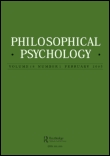
PHILOSOPHICAL PSYCHOLOGY
Exploring the Depths of Thought and BehaviorPHILOSOPHICAL PSYCHOLOGY, published by Routledge Journals, Taylor & Francis Ltd, stands at the intersection of philosophy and psychology, providing a unique platform for the exploration of how philosophical concepts inform psychological theories and practices. With a publication history dating back to 1988 and continuing through 2024, this journal offers researchers, professionals, and students a prestigious forum to disseminate their findings and insights, contributing significantly to both the Applied Psychology and Philosophy fields. The journal has achieved a notable impact factor, underscored by its ranking in the top quartile of Philosophy and third quartile in Applied Psychology, according to the 2023 category quartiles. Researchers can access a wealth of multidisciplinary studies, discussions, and theoretical analyses that enhance the understanding of human behavior and cognition through a philosophical lens. This makes PHILOSOPHICAL PSYCHOLOGY an essential read for anyone engaged in the critical examination of psychological phenomena.
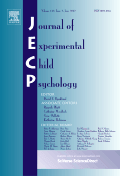
JOURNAL OF EXPERIMENTAL CHILD PSYCHOLOGY
Unveiling Insights into Children's Cognitive and Emotional GrowthJOURNAL OF EXPERIMENTAL CHILD PSYCHOLOGY, published by Elsevier Science Inc, stands as a premier outlet for high-quality research in the fields of Developmental and Educational Psychology and Experimental and Cognitive Psychology. With an impressive impact factor and recognized within the Q1 category for both developmental and experimental psychology, this journal is dedicated to advancing our understanding of child psychology through rigorous empirical research and theoretical contributions. Indexed with an ISSN of 0022-0965 and E-ISSN 1096-0457, it is a vital resource for scholars aiming to explore the complexities of children's cognitive, social, and emotional development from 1964 to 2024. Engaging with this journal provides researchers, professionals, and students access to cutting-edge findings that inform practice, policy, and future studies in the ever-evolving landscape of child psychology.
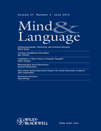
MIND & LANGUAGE
Innovating Understanding in Linguistics and PhilosophyMIND & LANGUAGE, published by WILEY, is a premier academic journal that has established itself as a leading platform for interdisciplinary research at the intersection of linguistics, philosophy, and cognitive science. With a noteworthy impact factor and a remarkable ranking in the top quartiles (Q1) for both Linguistics and Language as well as Philosophy, it reflects the journal’s robust contribution to the academic community, garnering attention from researchers and scholars worldwide. Since its inception in 1986, MIND & LANGUAGE has provided an avenue for exploring the complexities of language perception, cognitive processes, and the philosophical implications of linguistic studies. Its comprehensive scope ensures that it remains a critical resource for professionals and students alike who are engaged in the exploration of language's role in human thought and society. The journal's rigorous peer-review process guarantees the high quality and scholarly integrity of the published work, making it an essential addition to any academic library.

COGNITION & EMOTION
Illuminating the Interplay Between Mind and EmotionCOGNITION & EMOTION is a leading academic journal published by Routledge Journals, Taylor & Francis Ltd, focusing on the dynamic interactions between cognitive processes and emotional responses. Established in 1987, this esteemed journal has made significant contributions to the fields of Arts and Humanities, Developmental and Educational Psychology, and Experimental and Cognitive Psychology, consistently ranking in the top quartile (Q1) across various categories. Housed in the United Kingdom, COGNITION & EMOTION boasts a remarkable impact factor, underscoring its influence and importance in advancing psychological research and theory. While this journal does not offer open access, it remains a vital resource for scholars, professionals, and students seeking to deepen their understanding of emotional and cognitive phenomena. With a commitment to rigorous peer-reviewed research and innovative insights, COGNITION & EMOTION is essential for anyone aiming to stay at the forefront of psychological studies.
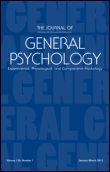
JOURNAL OF GENERAL PSYCHOLOGY
Charting New Territories in Psychological ResearchJOURNAL OF GENERAL PSYCHOLOGY, published by Routledge Journals, Taylor & Francis Ltd, stands as a premier platform for the dissemination of innovative research in the vast field of psychology. Established in 1928 and continuing its impactful publication until 2024, this journal encompasses a diverse scope, including significant contributions in Experimental and Cognitive Psychology, Gender Studies, and broader Arts and Humanities, making it a vital resource for scholars, practitioners, and students alike. With esteemed rankings such as Q1 in Arts and Humanities (miscellaneous) and exceptional positions in Gender Studies and Experimental Psychology, which respectively hold ranks of #17 and #33 in their fields, the journal is recognized for its rigorous scholarship and commitment to advancing knowledge. While it does not offer open access, its compelling content remains accessible to a wide academic audience, ensuring that groundbreaking findings and theoretical advancements continue to influence the discipline.

Journal of Cultural Cognitive Science
Bridging Cultures Through Cognitive UnderstandingThe Journal of Cultural Cognitive Science, published by SpringerNature, is an esteemed forum for researchers and scholars dedicated to exploring the intersection of culture, cognition, and language. With its ISSN 2520-100X and E-ISSN 2520-1018, this journal has made significant strides since its inception in 2017, covering a wide array of topics pertinent to Experimental and Cognitive Psychology and Linguistics and Language. Notably, it has achieved remarkable recognition, ranking in the Q3 category for Experimental and Cognitive Psychology and Q1 for Linguistics and Language in 2023. Its Scopus ranks further illustrate its impact, with the journal positioned at the 89th percentile in Social Sciences - Linguistics and Language and 47th percentile in Psychology. Despite its ongoing journey, it continues to foster open dialogue and innovation among professionals, researchers, and students, providing valuable insights and advancing knowledge in the field.
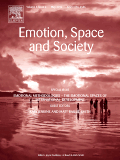
Emotion Space and Society
Delving into the Emotional Fabric of Human InteractionEmotion Space and Society, published by ELSEVIER SCI LTD, is an esteemed academic journal dedicated to advancing the fields of psychology, particularly in the domains of experimental and cognitive psychology, as well as social psychology. With an ISSN of 1755-4586 and an E-ISSN of 1878-0040, this journal has made significant contributions to understanding the complexities of emotional experiences and their impact on social dynamics since its inception in 2008. Currently holding a 2023 ranking of Q2 in both Experimental and Cognitive Psychology and Social Psychology, it is recognized for its ongoing commitment to excellence—positioning it at the 62nd percentile in Social Psychology and 59th percentile in Experimental and Cognitive Psychology according to Scopus rankings. Although unavailable as an Open Access journal, submissions to Emotion Space and Society engage a global readership, fostering critical discussions around emotional phenomena that resonate across interdisciplinary boundaries. Researchers, professionals, and students alike will find a wealth of knowledge and a platform for innovative exploration within the pages of this influential journal.
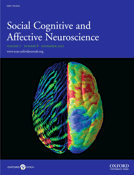
Social Cognitive and Affective Neuroscience
Innovating the Study of Brain and BehaviorSocial Cognitive and Affective Neuroscience, published by Oxford University Press, is a leading academic journal in the fields of cognitive neuroscience and experimental cognitive psychology. With an impact factor placing it in the Q1 category across three disciplines, including medicine, this journal stands at the forefront of research, promoting innovative studies that explore the intricate relationship between social processes and neural mechanisms. Since becoming Open Access in 2017, it has enhanced accessibility for researchers worldwide, facilitating the dissemination and discussion of groundbreaking findings. The journal, which has evolved significantly since its inception in 2006, is ranked among the top 10 in experimental and cognitive psychology and is highly regarded within the cognitive neuroscience community, making it a crucial resource for professionals, academics, and students eager to advance their understanding of the neural substrates underlying social cognition and emotion. The editorial board invites submissions that contribute to the interdisciplinary dialogue surrounding these critical areas of research, ensuring that the journal remains a vital platform for scholarly exchange.

SOCIAL COGNITION
Exploring the depths of social behavior and cognition.SOCIAL COGNITION, published by GUILFORD PUBLICATIONS INC, stands as a prominent journal in the fields of Developmental and Educational Psychology and Social Psychology, holding a commendable Q2 ranking in both categories as per the latest 2023 metrics. With an ISSN of 0278-016X, this journal has been a vital resource for researchers and practitioners since its inception in 1996, showcasing rigorous empirical studies and theoretical advancements that inform our understanding of social behavior and cognitive processes. While operating under traditional access options, the journal's diverse range of topics makes it essential reading for those exploring the intricacies of human thought and interaction, with its Scopus ranking reflecting its significance in contemporary psychological research. The editorial board seeks to further advance knowledge in this domain through innovative methodologies and interdisciplinary approaches, ensuring that SOCIAL COGNITION remains invaluable to its readership based in the United States and beyond.

Annual Review of Psychology
Your Gateway to Cutting-Edge Psychological ResearchThe Annual Review of Psychology, published by Annual Reviews, is a prestigious journal dedicated to synthesizing the most significant advancements and research findings in the field of psychology since its inception in 1950. With an ISSN of 0066-4308 and an E-ISSN of 1545-2085, this journal features interdisciplinary reviews that encompass diverse areas of psychology, ensuring comprehensive coverage of both theoretical and practical dimensions of the discipline. Currently ranking in the Q1 category for psychology (miscellaneous) and holding a remarkable rank of #1 out of 216 in General Psychology according to Scopus—placing it in the 99th percentile—this journal continually underscores its importance as a leading resource for researchers, professionals, and students alike. While it operates under a subscription model, it provides critical insights to advance knowledge and foster ongoing dialogue in psychology. The Annual Review of Psychology remains an essential platform for those seeking to stay at the forefront of psychological research and theory.